八下教案Unit1What
八年级英语下册教案(全册英文)
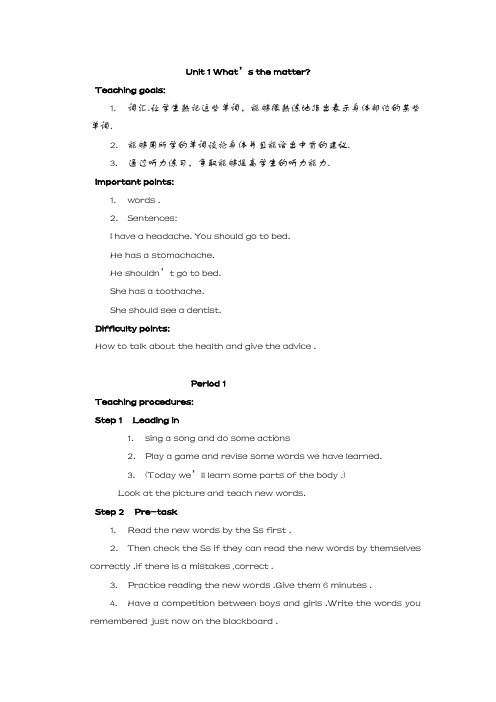
Unit 1 What’s the matter?Teaching goals:1.词汇.让学生熟记这些单词,能够很熟练地指出表示身体部位的某些单词.2.能够用所学的单词谈论身体并且能给出中肯的建议.3.通过听力练习,争取能够提高学生的听力能力.Important points:1.words .2.Sentences:I have a headache. You should go to bed.He has a stomachache.He shouldn’t go to bed.She has a toothache.She should see a dentist.Difficulty points:How to talk about the health and give the advice .Period 1Teaching procedures:Step 1 Leading in1.sing a song and do some actions2.Play a game and revise some words we have learned.3.(Today we’ll learn some parts of the body .)Look at the picture and teach new words.Step 2 Pre-task1.Read the new words by the Ss first .2.Then check the Ss if they can read the new words by themselves correctly .if there is a mistakes ,correct .3.Practice reading the new words .Give them 6 minutes .4.Have a competition between boys and girls .Write the words you remembered just now on the blackboard .Page7, 1a.Do this part by the Ss first. Write the correct letter after the name of each body part on the listPlay a game .All the Ss close your books ,we’ll have a instructor to say :Touch your nose /head /right ear ….Let’s see which student do it correctly and quickly .First all the Ss do this game .Then have competitions between boys and girls .5 boys and 5girls to the front to do what the instructor said .if you are wrong ,please go back to your seats ,the last one who stands at the front is the winner .Step 3 While-task1.Look at the picture and learn the main sentences.A: What’s the matter with you ?B: I have a cold.2. SB Page 7,1c Look at the pictures , work in pairs and act out.3. SB Page 7, 1b .(1) Listen and check the answers .(2) Listen and fill in the blanks.Step 4 Post-task同桌之间设计一个医生与病人之间的对话.Step 5. Exercises in classPeriod 2Teaching procedures :Step 1 Leading in1.Revise : Ask several pairs of students to the front of theclassroom to act out the dialogue:What’s the matter with you ?I have a sore throat.Then ask others : What’s the matter with him/her ?Help Ss answer : He has a sore throat. He should drink lots of water.2.look at pictures and practise the dialogue.Step 2 While-taskSB Page 8, 2a1.Point out the eight items in this activity .Read the item to the class .Ss repeat .2.There are different conversations .Listen carefully . people are talking about health problems they have and getting advice .3.Match the problems with the advice .4.Check the answers .SB Page 8, 2b .Pay attention to the four pictures .1.Each of these pictures illustrates one of the conversations .2.Play the tape ,write the missing words on the blank lines .3.Play the tape again and check the answers .4.Pairwork. Practice reading the dialogues in the pictures .Take turns having the problem and giving the advice .5.Practice reading the dialogue in 2c ,and make their onw conversations .6.Act out the dialogue .SB Page 9, 3a .1.Point out the picture and ask Ss to describe it .(There is a boy sitting on a bench .He’s sick .A teacher is talking to him )2.Pay attention to the dialogue and the blanks in the dialogue .3.Fill in the blanks in the conversation .4.Go over the answers.5.Practice reading the dialogue with a student, then work in pairs . Step 3 Post-taskSB Page 9 , 3b .1.Look at the picture and make your own dialogues setting 3a as an example .2.Act out the dialogue .Ask some pairs to come to the front to act out their onw dialogues .SB Page 9, Part 4. w W w . x K b 1.c o M1.Read the instructions and demonstrate what a “mime”is .2.Read the dialogue by the Ss .3.Ask a student to come to the front and mime an illness ,the other Ss guess what the illness is .4.Ask one student to give advice .5.Give several students an opportunity to come to the front and mime an illness .Step 4Exercises in classHomework1.When you had some problems. Please remember what the doctor said .Remember the new words .Period 3Teaching procedures :Step 1 Leading1.Play the game :One student mimes an illness , the other students guess the illness and give advice .What’s the matter? Do you have a sore throat ?2. Revise how to talk about health and give advice.Step 2 Pre-taskSB Page 10 ,1a .1.Look at the picture .Point out the four new words and expressions .Say each word and ask Ss to repeat .2.The first picture .Explain something about it using one of the four words and expressions .3.Match the words with the pictures by the Ss .4.Check the answers .5.Practice reading and make sure the Ss understand the meaning of the words .SB Page 10 ,1b1.Read the four sentences ,Ss practice reading .2.Look at the picture and match each picture with advice.3.Check the answerStep 3 While-taskSB Page 10 ,2a & 2b .1.First ,make sure the Ss understand what they will hear .2.Then read the four names3.Listen and write the problems on the bland lines .If possible ,write what each person “should”and “shouldn’t”do for their problem.4.Check the answers .Step 4 Post-taskSB Page 10,2c .1.Ask two students to read the conversation to the class .2.Pairwork .Make conversations with your partner .3.Act out the conversations for the class .4.Write two dialogues in the exercise book .5.Exercises in classPeriod 4Teaching procedures :Step 1 LeadingDiscussion: how to keep healthy.Step 2 While taskSB Page 11, 3a1.Read the article and fill in the form.2.Check the answers .3.Explanation4.ExercisesStep 3 Post taskSB Page 11, 3bLet the Ss read the paragraph and fill in the blanks .Check the answers .SB Page 11 ,Part 4.Play the gamePeriod 5 Self checkSB Page 12 , Part 1 .1.Fill in the blanks on their own .2.Make your own sentences with the words .SB Page 12, Part 2.Read the letter .Make sure Ss can understand it . Step 6 Homework1.Remember the words in this unit .2. Do the exercises on Pages 6-8of the workbook . 【课后反思】Unit 2 I’ll help clean up the city parksUnit 2 Section A 1a-Grammar Focus【学习目标】1.重点词汇用法及短语动词用法。
人教新目标八年级英语下册教案Unit1Whatsthemat教案

Unit1 What’s the matter?复习课教学设计一、设计背景初中英语升学考试所涉及的知识面广,因而复习时需要扎扎实实打好基础,对课本的复习可以说是以“地毯式”搜捕的方式进行的。
教师要在有限的时间内完成如此大容量的复习任务,就必须要想方设法提高复习效率,让学生的复习取得事半功倍的效果。
我在复习中采用“知识递进式”复习法,用话题带动词句的使用,注重知识的综合运用。
二、设计理念本课是以“problems and advice”为话题的复习课,课堂上把主动权交给学生,以听说训练为主线,通过看、听、说、写等一系列教学活动,让学生运用所学知识来完成单词拼写、即时翻译短语、小组合作翻译句子,定时背诵语篇。
使学生获得最基本的英语听、说、读、写能力,并在教学中充分激发学生强烈的学习愿望。
在注重学生知识能力发展的同时,注重提高学生的人格修养,学会关心别人,帮助别人,达到培养学生互助的德育教育的目的。
三、教学目标设计用具体、明确、可操作的行为语言,描述本课的知识、技能、能力、方法、情感、态度、价值观等方面的教学目标。
Objectives: By the end of the session, most students will be better able to acquire the required information. This will be achieved by: 1.Knowledge Objectives:1)Be able to master the pronunciation, meaning and spellingof the names of diseases: fever, sore throat, sore back; stomachache, headache, toothache, cold, cough; 2) Be able tolearn the e某pressions of giving advice: lie down and rest, drink hot tea with honey, see a dentist, take this medicine;3) Be able to talk about health problems by using “What’s the matter? I have a?” and give advice by using “Youshould?You shouldn’t?” 2. Ability Objectives:1) Be able to talk about one’s health problems and give advice fluently; 2) Be able to role play doctor and patient; 3. Moral Objectives:1) Improve the cooperative spirit through pair work and role playing 2) Care more about yourself and your family members’ health. 四、教学重点难点设计由于本节课的话题是谈论健康,根据教学大纲的要求,学生需掌握有关疾病的单词,并能针对疾病提出合理的建议。
人教版八年级下册英语教案(全册)
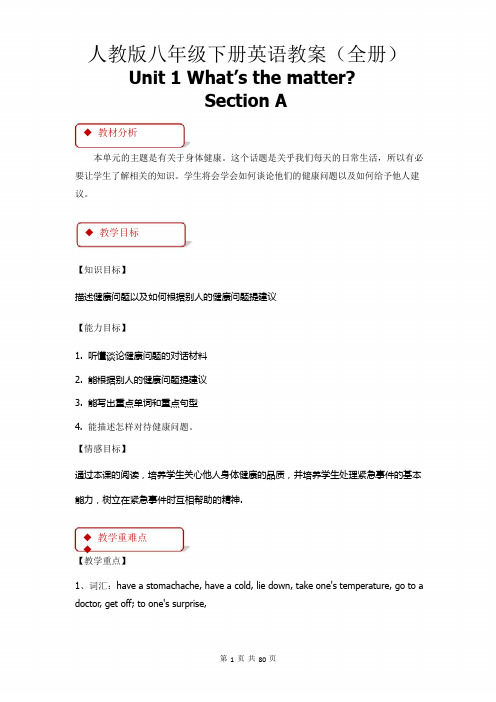
人教版八年级下册英语教案(全册)Unit1What’s the matter?Section A◆教材分析本单元的主题是有关于身体健康。
这个话题是关乎我们每天的日常生活,所以有必要让学生了解相关的知识。
学生将会学会如何谈论他们的健康问题以及如何给予他人建议。
◆教学目标【知识目标】描述健康问题以及如何根据别人的健康问题提建议【能力目标】1.听懂谈论健康问题的对话材料2.能根据别人的健康问题提建议3.能写出重点单词和重点句型4.能描述怎样对待健康问题。
【情感目标】通过本课的阅读,培养学生关心他人身体健康的品质,并培养学生处理紧急事件的基本能力,树立在紧急事件时互相帮助的精神.◆教学重难点◆【教学重点】1、词汇:have a stomachache,have a cold,lie down,take one's temperature,go to a doctor,get off;to one's surprise,2、句型:1.——What's the matter?——I have a stomachache.You shouldn't eat so much next time.2.——What's the matter with Ben?——He hurt himself.He has a sore back.——He should lie down and rest.【教学难点】掌握情态动词should shouldn't.的用法;学习have的用法◆课前准备◆Multimedia,group work,cooperative discussion.◆教学过程Step1.Warm up1.Look at the picture and learn the parts of the body.2.New words and phrases.Step2Presentation1.1aLook at the picture.Write the correct letter[a-m]for each part of the body.Then check the answers.2.1bFirst,lead Ss to read the five names.Then look at the picture.Number the names1-5.’sFinally, check the answers.3. 1cDivide two Ss into a pair to make conversations. Finally, invite several pairs to act outfor the class.Step 3 Practice1. 2aTell Ss there are five conversations. In each conversation the person says what goingon with them. Listen carefully and number the pictures.Play the tape. Then check the answers.2. 2bAsk Ss to listen to the recording again to match the problems with the advice.Play the recording again. Then check the answers.3. 2cAsk Ss to make conversations using the information in 2a and2b. Give them enoughtime to do this task. Later , invite several pairs to present their conversations to theclass.Step 4 Consolidation1. 2dFirst, ask Ss to have a fast reading of the conversation to get the main idea.Then, lead Ss to read the conversation sentence by sentence, explain some languagepoints.Finally, divide Ss into pairs to practice role-playing the conversation.2. 3aFirst, read the passage quickly and answer the question.Then,lead Ss to read the passage and analyse the key points.Finally,read together.3.3bRead the passage again and check the things that happened in the story3cDiscuss the questions with a partner.4.Grammar focusFirst,lead Ss to read the sentences.Then,prompt Ss to analyse the use of model verb should.After that,explain the grammar together.5.4aAsk Ss to fill in the blanks.Then,invite some Ss to present their answers.6.4bAsk Ss to circle the best advice for these health problems,then add their own advice.After that,invite some Ss to present their advice.7.4cOne student mimes a problem.The other students in your group guess the problem and give advice.Step5Language pointsStep6HomeworkMake a conversation about health problems and giving advice.Unit1What’s the matter?Section B◆教材分析本单元的主题是有关于身体健康。
人教版八年级下册Unit1Whatx27sthematter?教案
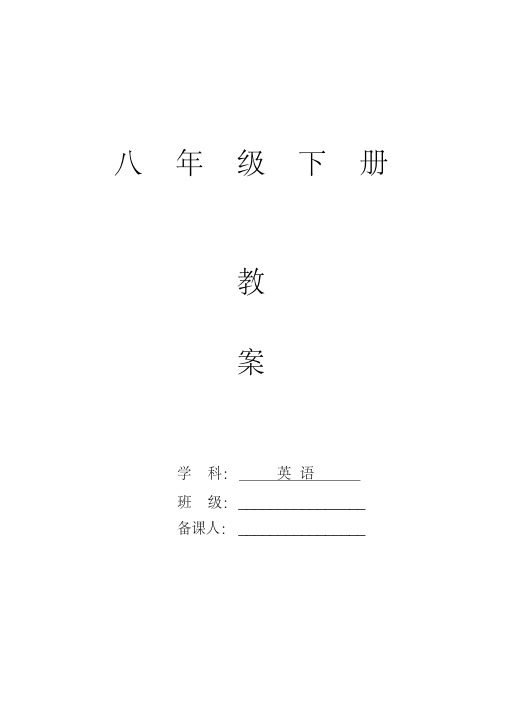
tooth-teeth, foot-feet , matter, have a cold, stomachache, , backache, headache, toothache
2)Ss can use the following sentence patterns:
What's the matter? I have a stomach./I have a sore back./I have a cold.
He/She has a sore throat.
Ability aims: Learn how to talk about health problems
Important & difficult points:
Learn how to talk about health, use have to talk about health problems
4.Work on Section A 1a
5. Play a game: Touch the parts of your body
1)Let the whole class touch the parts of their body when teacher say: Touch your
…
2)Ask eight Ss to come to the front and do as the teacher tells them: Touch your … if one does
What's the matter? He/ She has a headache/ toothache /a sore back/ a sore throat/a cold and a cough.
人教新目标版英语八下Unit1《What’sthematter》(Period3)说课稿

人教新目标版英语八下Unit 1《What’s the matter》(Period 3)说课稿一. 教材分析《人教新目标版英语八下Unit 1 What’s the matter》(Period 3)的主要内容是围绕询问和描述身体不适和情感状态展开的。
本节课的主要目的是让学生能够用英语询问他人的不适,并能够用正确的词汇描述各种身体不适和情感状态。
教材通过丰富的情景设置和任务型活动,帮助学生巩固和运用所学知识,提高他们的语言运用能力。
二. 学情分析学生在进入本节课的学习之前,已经掌握了基本的日常交际用语,对询问和描述身体状况有一定的了解。
然而,学生在运用英语进行描述时,可能会遇到一些困难,如词汇量的限制和语法结构的掌握。
因此,在教学过程中,教师需要关注学生的个体差异,合理安排教学内容,以确保每个学生都能在课堂上得到充分的练习和提高。
三. 说教学目标1.知识目标:学生能够掌握和运用本节课的核心词汇和句型,如“What’s the matter?”, “I have a headache./I feel tired.”等。
2.能力目标:学生能够在真实情境中运用所学知识进行询问和描述他人的身体不适和情感状态。
3.情感目标:培养学生关心他人,善于倾听和帮助他人的品质。
四. 说教学重难点1.教学重点:学生能够熟练运用本节课的核心词汇和句型进行询问和描述他人的身体不适和情感状态。
2.教学难点:学生能够正确运用语法结构,如“How long have you hadthis problem?”等,来询问他人的不适。
五. 说教学方法与手段在本节课的教学过程中,我将采用任务型教学法和情境教学法。
通过设置各种真实情境,让学生在实践中运用所学知识。
同时,我将运用多媒体教学手段,如图片、视频等,来帮助学生更好地理解和运用所学知识。
六. 说教学过程1.热身(5分钟):通过播放一首关于身体不适的英文歌曲,激发学生的学习兴趣,并引导学生回忆已学的相关知识。
八年级下册英语Unit 1 What's the matter 教案
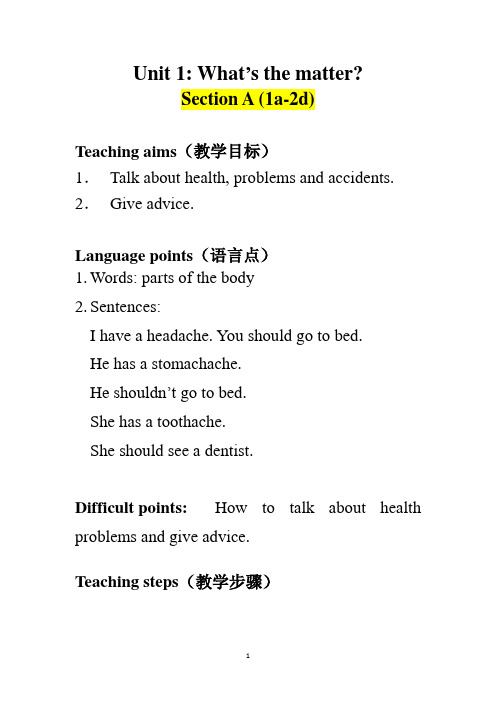
Unit 1: What’s the matter?Section A (1a-2d)Teaching aims(教学目标)1.Talk about health, problems and accidents. 2.Give advice.Language points(语言点)1.Words: parts of the body2.Sentences:I have a headache. You should go to bed.He has a stomachache.He shouldn’t go to bed.She has a toothache.She should see a dentist.Difficult points: How to talk about health problems and give advice.Teaching steps(教学步骤)1. Warm-up and review(课堂热身和复习)(1)New term greetings (新学期问候)T: Nice to see you again, everyone! All of you look so well. Did you enjoy your winter vacation?Ss: Yes.T: Can you tell me something interesting you did during the winter vacation?(老师可以鼓励学生给出尽可能多的答案)T: Oh. What an interesting vacation! I am sure you enjoyed yourselves very much, but I was ill during the holiday. Today, we’ll talk about “Unit 1: What’s the matter?”T: First, let’s review the parts of the body.Have Ss look at the picture and teach the new words.T:Let’s play a Bingo game.T: Let’s play a guessing game.教学设计说明:复习身体部位并通过游戏巩固,为完成1a服务。
人教新目标版英语八下Unit1《What’sthematter》(SectionA(第2课时)说课稿

人教新目标版英语八下Unit 1《What’s the matter》(Section A(第2课时)说课稿一. 教材分析《人教新目标版英语》八下Unit 1《What’s the matter》Section A(第2课时)的主要内容是围绕询问和描述人们在不同情境下的情绪和感受展开。
本节课主要通过一个关于描述人们在不同情境下情绪的对话,让学生学会如何用英语询问和描述他人的情绪和感受,并能够运用所学知识进行实际交流。
二. 学情分析在进入八年级下学期时,学生已经掌握了基本的英语语法和词汇,具备了一定的听说读写能力。
通过对学生的和观察,我发现他们对学习英语有着浓厚的兴趣,并且希望能够通过英语学习了解更多的外国文化。
然而,学生在实际运用英语进行交流时,往往会出现表达不准确、语法错误等问题。
因此,在教学过程中,需要关注学生的语言运用能力,提高他们的语言表达准确性。
三. 说教学目标1.知识目标:学生能够掌握并运用本节课的重点词汇和句型,如“What’s the matter?”、“How do you feel?”等,描述他人的情绪和感受。
2.能力目标:学生能够在真实情境中运用所学知识进行交流,提高他们的语言运用能力。
3.情感目标:学生能够关爱他人,善于倾听和理解他人的情绪和感受,培养良好的人际交往能力。
四. 说教学重难点1.重点:本节课的重点是让学生学会如何用英语询问和描述他人的情绪和感受。
2.难点:学生在实际运用英语进行交流时,如何准确地表达自己的观点和情感。
五. 说教学方法与手段1.任务型教学法:通过设定不同的任务,让学生在完成任务的过程中运用所学知识进行交流。
2.情境教学法:创设真实的情境,让学生在实际情境中感受和体验所学知识。
3.小组合作学习:采用小组合作的形式,让学生在小组内进行讨论和交流,提高他们的合作能力。
六. 说教学过程1.导入:通过展示一组图片,让学生观察并描述图片中人物的表情和情绪,引出本节课的主题。
人教版八年级英语下Unit1What’sthematter(SectionA3a4c)说课稿
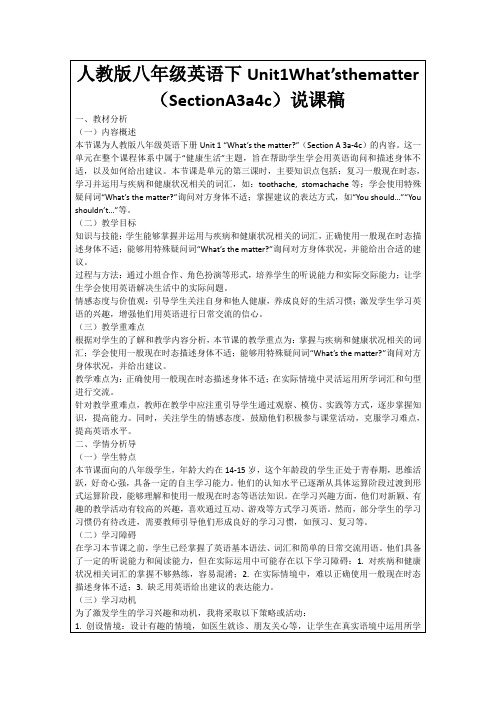
5.联系生活:将教学内容与学生的生活实际相结合,让学生感受到英语学习的实际意义,提高他们的学习兴趣。
三、教学方法与手段
(一)教学策略
我将采用任务型教学法、情境教学法和合作学习法作为主要教学方法。任务型教学法通过设计真实、有意义的任务,让学生在完成任务的过程中习得语言知识,提高语言运用能力。情境教学法则是通过模拟生活情境,让学生在情境中感知、体验和运用语言,增强学习的现实意义。合作学习法则强调学生之间的互动和协作,通过小组讨论、角色扮演等活动,促进学生之间的交流与合作,共同完成学习任务。选择这些方法的理论依据主要是交际语言学习理论、建构主义学习理论和人本主义学习理论,这些理论强调学习者的主动参与、意义建构和情感因素在学习过程中的重要性。
(三)互动方式
为了促进学生的参与和合作,我计划设计以下师生互动和生生互动环节:
1.师生互动:通过提问、回答、示范等方式,引导学生积极参与课堂讨论,及时给予反馈和鼓励,建立良好的师生互动关系。
2.生生互动:组织学生进行小组活动,如角色扮演、小组讨论、共同完成任务等,鼓励学生相互交流、相互学习,提高合作能力。
(三)学习动机
为了激发学生的学习兴趣和动机,我将采取以下策略或活动:
1.创设情境:设计有趣的情境,如医生就诊、朋友关心等,让学生在真实语境中运用所学知识;
2.小组合作:组织学生进行小组讨论、角色扮演等活动,提高他们的参与度和合作意识;
3.激励评价:对学生的表现给予及时、积极的评价,关注每个学生的进步,提高他们的自信心;
1.生活情境:通过展示一位学生在体育课上受伤的视频,引发学生对健康问题的关注,进而引出本节课的主题“What’s the matter?”。
人教版八年级英语下册《Unit 1 Unit 1 What’s the matter?》教案.doc
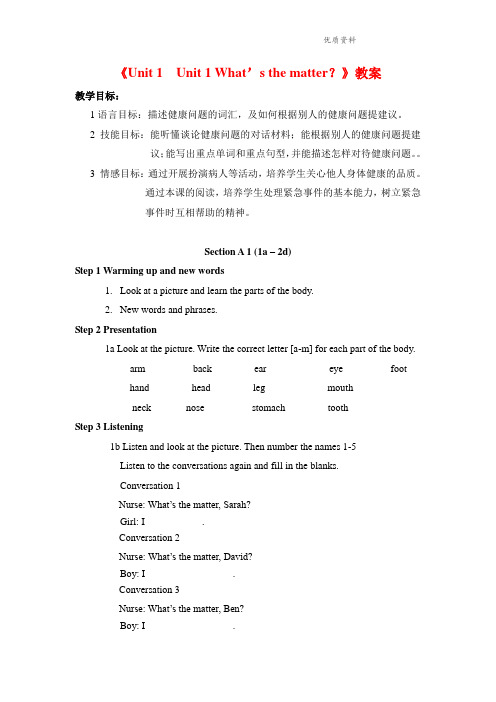
《Unit 1 Unit 1 What’s the matter?》教案教学目标:1语言目标:描述健康问题的词汇,及如何根据别人的健康问题提建议。
2 技能目标:能听懂谈论健康问题的对话材料;能根据别人的健康问题提建议;能写出重点单词和重点句型,并能描述怎样对待健康问题。
3 情感目标:通过开展扮演病人等活动,培养学生关心他人身体健康的品质。
通过本课的阅读,培养学生处理紧急事件的基本能力,树立紧急事件时互相帮助的精神。
Section A 1 (1a – 2d)Step 1 Warming up and new words1.Look at a picture and learn the parts of the body.2.New words and phrases.Step 2 Presentation1a Look at the picture. Write the correct letter [a-m] for each part of the body.___arm ___ back ___ ear ___ eye ___ foot___hand ___ head ___ leg ___ mouth___ neck ___nose ___ stomach ___ toothStep 3 Listening1b Listen and look at the picture. Then number the names 1-5Listen to the conversations again and fill in the blanks.Conversation 1Nurse: What’s the matter, Sarah?Girl: I ___________.Conversation 2Nurse: What’s the matter, David?Boy: I _________________.Conversation 3Nurse: What’s the matter, Ben?Boy: I _________________.Conversation 4Nurse: What’s the matter, Nancy?Girl: I _________________.Conversation 5Betty: What’s the matter, Judy?Ann: She __________________.Step 4 Speaking1c Look at the pictures. What are the students’ problems? Make conversati ons.ExamplesA: What’s the matter with Judy?B: She talked too much yesterday and didn’t drink enough water.She has a very sore throat now.A: What’s the matter with Sarah?B: She didn’t take care of herself on the weekend. She was p laying withher friends at the park yesterday. Then it got windy, but she didn’t puton her jacket. Now she has a cold.Step 5 Guessing gamesGuess what has happened to the students by using the important sentenc es. Step 6 Listening2a Listen and number the pictures [1-5] in the order you hear them.2b Listen again. Match the problems with the advice.Step 7 Speaking2c Make conversations using the information in 2a and 2bA: What’s the matter?B: My head feels very hot.A: Maybe you have a fever.B: What should I do?A: You should take your temperature.Step 8 Role–playImagine you are the school doctor. A few students have health problems.Role-play a conversation between the doctor and the students.2d Role –play the conversationStep 9 Language points and summary1. What’s the matter?这是人们特别是医生和护士询问病人病情时最常用的问句, 意思是“怎么了?”其后通常与介词with连用。
人教版八年级下册英语Unit1(第一单元)优秀教案

Unit 1 What's the matter?第一课时Section A (1a2d)【教学目标】1.重点单词:matter,back,sore,throat,stomachache,foot,neck,stomach,fever,lie,rest,cough,Xray,toothache,headache2 重点短语:have a sore throat,have a stomachache,have a cold,lie down,take one's temperature,have a fever,go to a doctor3 重点句式:—What's the matter?—She talked too much yesterday and didn't drink enough water.She has a very sore throat now.You should drink some hot tea with honey.It doesn't sound like you have a fever.You need to take breaks away from the computer.I think I sat in the same way for too long without moving.If your head and neck still hurt tomorrow,then go to a doctor.【学习重点】1 重点短语和句型2 询问对方身体状况的句型及答语【学习难点】询问对方身体状况的句型及答语【自主学习】一、预习课本P12新单词并背诵,完成下面的汉译英。
1 问题____________ 2.背部____________3 疼痛的____________ 4.嗓子____________5 胃痛____________ 6.脚____________7 脖子____________ 8.胃____________9 发烧____________ 10.平躺____________11 休息____________ 12.咳嗽____________13 X光____________ 14.牙疼____________15 头疼____________二、认真预习1a2d找出下列短语和句型。
Unit1 What’sthematter(SectionB1a-1d)教案
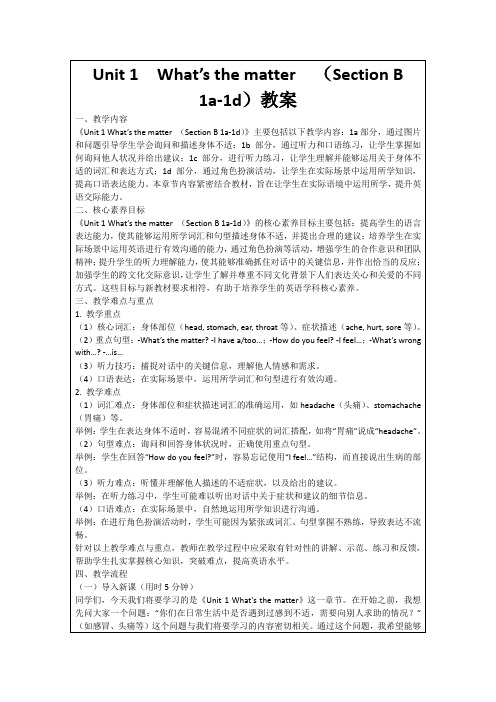
一、教学内容
《Unit 1 What’s the matter(Section B 1a-1d)》主要包括以下教学内容:1a部分,通过图片和问题引导学生学会询问和描述身体不适;1b部分,通过听力和口语练习,让学生掌握如何询问他人状况并给出建议;1c部分,进行听力练习,让学生理解并能够运用关于身体不适的词汇和表达方式;1d部分,通过角色扮演活动,让学生在实际场景中运用所学知识,提高口语表达能力。本章节内容紧密结合教材,旨在让学生在实际语境中运用所学,提升英语交际能力。
4.学生小组讨论环节,大家积极参与,讨论热烈。但在引导和启发学生思考方面,我觉得还有提升的空间。今后,我将更加注重提问的技巧,引导学生深入思考,提高他们的分析问题和解决问题的能力。
5.总结回顾环节,学生对今天所学知识有了更加清晰的认识。但在教学过程中,我发现部分学生对知识点的掌握程度仍有待提高。因此,我将在课后加强辅导,关注学生的复习情况,确保他们能够真正掌握所学知识。
(2)句型难点:询问和回答身体状况时,正确使用重点句型。
举例:学生在回答“How do you feel?”时,容易忘记使用“I feel…”结构,而直接说出生病的部位。
(3)听力难点:听懂并理解他人描述的不适症状,以及给出的建议。
举例:在听力练习中,学生可能难以听出对话中关于症状和建议的细节信息。
3.重点难点解析:在讲授过程中,我会特别强调询问和回答身体状况的重点句型和词汇。对于难点部分,如词汇搭配和听力技巧,我会通过举例和练习来帮助大家理解。
(三)实践活动(用时10分钟)
1.分组讨论:学生们将分成若干小组,每组讨论一个与身体不适相关的实际问题,如如何询问同学的身体状况并给出合适的建议。
八年级英语下册 Unit 1 What’s the matter?教案
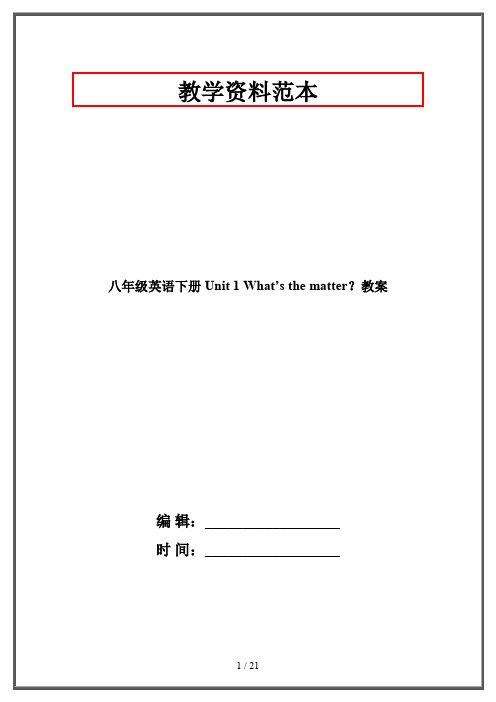
Step 9 Language points and summary
1. What’s the matter?
这是人们特别是医生和护士询问病人病情时最常用的问句,意思是“怎么了?”其后通常与介词with连用。类似的问句还有:
What’s wrong?怎么啦?
教学难点:掌握情态动词should \shouldn’t. 的用法
学习have的用法
课时划分:
Section A1 1a – 2d
Section A2 3a-3c
Section A3 Grammar Focus-4c
Section B1 1a-2e
Section B2 3a-Self check
Section A1(1a – 2d)
A: Maybe you have a fever.
B:What should I do?
A: You should take your temperature.
Step8Role–play
Imagine you are the school doctor. A few students have health problems. Role-play a conversation between the doctor and the students.
3 情感目标:通过开展扮演病人等活动,培养学生关心他人身体健康的品质。
通过本课的阅读,培养学生处理紧急事件的基本能力,树立紧急事件时互相帮助的精神。
教学重点:
短语:have a stomachache, have a cold, lie down, take one’s temperature,
人教版英语八年级下册-Unit 1 Section A (1a—2d)教案
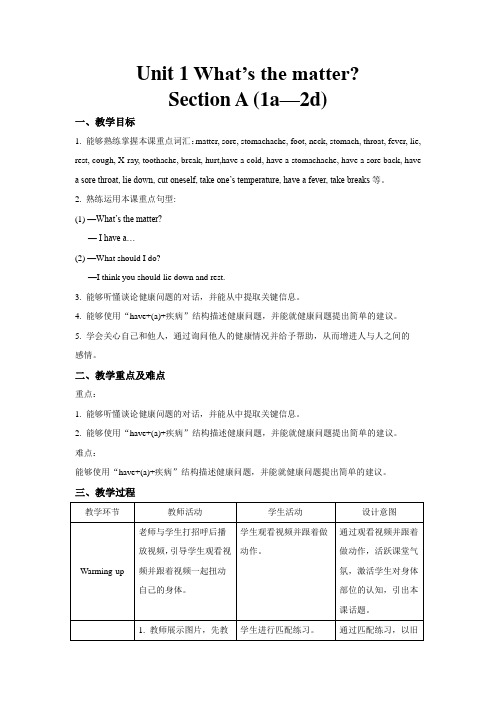
Unit 1 What’s the matter?Section A (1a—2d)一、教学目标1. 能够熟练掌握本课重点词汇:matter, sore, stomachache, foot, neck, stomach, throat, fever, lie, rest, cough, X-ray, toothache, break, hurt,have a cold, have a stomachache, have a sore back, havea sore throat, lie down, cut oneself, take one’s temperature, have a fever, take breaks等。
2. 熟练运用本课重点句型:(1) —What’s the matter?—I have a…(2) —What should I do?—I think you should lie down and rest.3. 能够听懂谈论健康问题的对话,并能从中提取关键信息。
4. 能够使用“have+(a)+疾病”结构描述健康问题,并能就健康问题提出简单的建议。
5. 学会关心自己和他人,通过询问他人的健康情况并给予帮助,从而增进人与人之间的感情。
二、教学重点及难点重点:1. 能够听懂谈论健康问题的对话,并能从中提取关键信息。
2. 能够使用“have+(a)+疾病”结构描述健康问题,并能就健康问题提出简单的建议。
难点:能够使用“have+(a)+疾病”结构描述健康问题,并能就健康问题提出简单的建议。
三、教学过程四、板书设计Unit 1What’s the matter?第1课时Section A (1a—2d)Key words and phrases: matter, sore, stomachache, foot, neck, stomach, throat, fever, lie, rest, cough, X-ray, toothache, break, hurt,have a cold, have a stomachache, have a sore back, have a sore throat, lie down, cut oneself, take one’s temperature, have a fever, take breaksKey sentences:1. —What’s the matter?—I have a…2. —What should I do?—I think you should lie down and rest.。
八年级英语下册第一单元备课教案Unit 1 第1课时教案(八下)
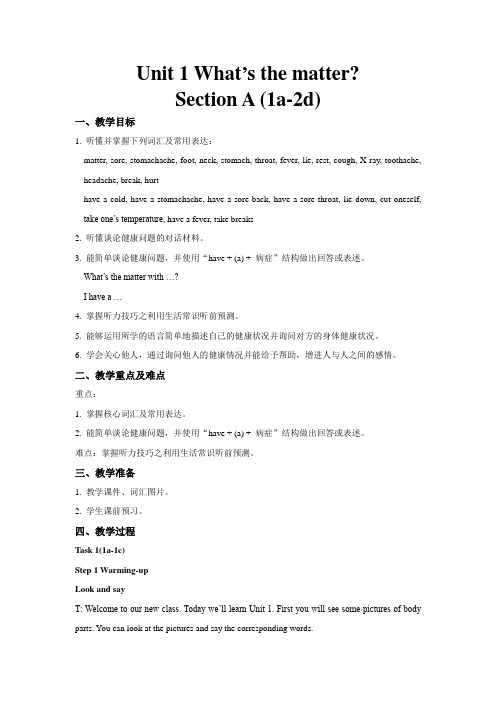
Unit 1 What’s the matter?Section A (1a-2d)一、教学目标1. 听懂并掌握下列词汇及常用表达:matter, sore, stomachache, foot, neck, stomach, throat, fever, lie, rest, cough, X-ray, toothache, headache, break, hurthave a cold, have a stomachache, have a sore back, have a sore throat, lie down, cut oneself, take one’s temperature, have a fever, take breaks2. 听懂谈论健康问题的对话材料。
3. 能简单谈论健康问题,并使用“have + (a) + 病症”结构做出回答或表述。
What’s the matter with …?I have a …4. 掌握听力技巧之利用生活常识听前预测。
5. 能够运用所学的语言简单地描述自己的健康状况并询问对方的身体健康状况。
6. 学会关心他人,通过询问他人的健康情况并能给予帮助,增进人与人之间的感情。
二、教学重点及难点重点:1. 掌握核心词汇及常用表达。
2. 能简单谈论健康问题,并使用“have + (a) + 病症”结构做出回答或表述。
难点:掌握听力技巧之利用生活常识听前预测。
三、教学准备1. 教学课件、词汇图片。
2. 学生课前预习。
四、教学过程Task 1(1a-1c)Step 1 Warming-upLook and sayT: Welcome to our new class. Today we’ll learn Unit 1. First you will see some pictures of body parts. You can look at the pictures and say the corresponding words.设计意图:复习已学的单词,为本单元“健康与急救”话题的学习奠定基础。
Unit1What'sthematter人教版英语八年级下册教案

(3)时态运用:一般现在时和现在进行时在本章节的对话和描述中占有重要地位,教师需重点讲解并指导学生如何在询问和描述身体状况时正确运用这两种时态。
二、核心素养目标
《Unit 1 What's the matter》的教学旨在培养学生的英语学科核心素养,具体目标如下:
1.提升学生的语言能力,通过学习本章内容,使学生能够熟练运用英语询问和描述身体状况,表达关心与建议,提高实际生活中的交际能力;
2.增强学生的文化意识,了解和尊重不同文化背景下对待疾病和身体状况的态度及表达方式;
举例:
-当学生询问他人身体状况时,能使用"What's the matter?"这一核心句型;
-当描述自己或他人身体不适时,能运用"I have a stomachache."、"You have a fever."等句型;
-在给出建议时,可以使用"You should take some medicine."等短语。
四、教学流程
(一)导入新课(用时5分钟)
同学们,今天我们将要学习的是《Unit 1 What's the matter》这一章节。在开始之前,我想先问大家一个问题:“你们在日常生活中是否遇到过朋友或家人身体不适的情况?”比如,朋友突然说肚子疼,你会怎么关心和帮助他们呢?这个问题与我们将要学习的内容密切相关。通过这个问题,我希望能够引起大家的兴趣和好奇心,让我们一同探索如何用英语询问和描述身体状况。
人教新目标八下教案:Unit1 What's the matter(Section B (1a-1d))
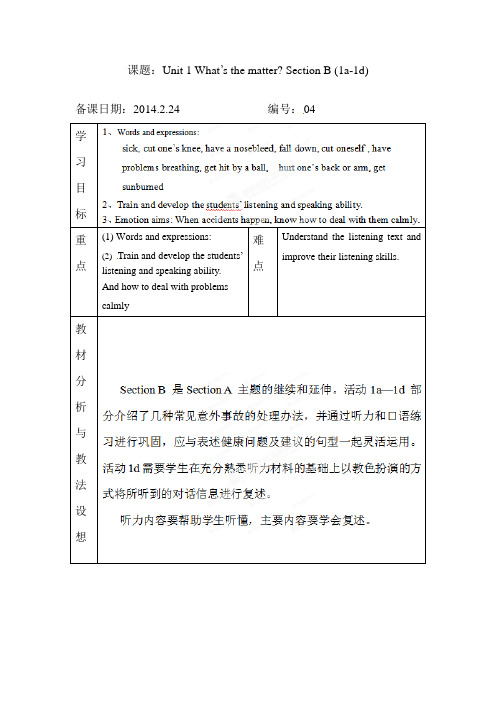
课题:Unit 1 What’s the matter? Section B (1a-1d) 备课日期:2014.2.24 编号:04学习目标重点(1) Words and expressions:(2) Train and develop the students’listening and speaking ability.And how to deal with problemscalmly难点Understand the listening text andimprove their listening skills.教材分析与教法设想板书设计教学过程导学过程学习过程Step1. Warming upTaskT: You know, there are lots of problems in ourlife. If you are a doctor, please tell us how tosolve the problem. I will divide you into 9groups. Please work in groups. And thenchoose one of you to report your ideas.The following are the problems:I have a toothach e.I am hungry. I have a sore throat.I am stressed out. I have a sore back.I am tired. I can’t sleep.I have a cold. I have a he adache.T encourages the students to give advice asmuch as possible.Step2. Presentation1.Show some pictures on the screen,discuss the accidents with the students,teaching the new words: cut oneself, cutone’s hand / finger, fall down ,cut one’sknee, have a nosebleed, have problemsbreathing, get hit by a ball, get hit onthe head ,hurt one’s back or arm, getsunburned and so on.2.Let students do 1a individually. Thencheck the answers by asking a studentsto say out the answers.3.Have students describe the actions whatReport:If you have a headache,you should go to bed early.You should see thedoctor. You should eatsome medicine.You shouldn’t washyour face with cold water.You shouldn’t sleep late.You shouldn’t swim.…..Let students do 1aindividually. Thencheck the answers b yasking a stu dents tosay out the answers.Listen to the school nurse.Check the problems youhear. Play the recordingtwice, then check theanswersyou should do when the accidentshappen in order, using first, next, thenand so on.Step4.Practice1d. Role-play a conversation between the nurse and the teacher. Use the information in 1b and 1c. First let studen ts read the listening text, and try to work in pairs according to it. Then invite some pairs to act out their conversations in front.Step5.ExercisesShow some exercises on the screen and Ss do them carefully. Then check the answers.Step 6.HomeworkRemember the expressions learnt in the period. Role-play a conversation between the nurse and the teacher.Remember the expressions learnt in the period.Write a passage about what you should do and shouldn’t do if accidents happen according to the contents in the period.教本节课听力内容较为简单,因此可用一部分时间对上节课。
人教新目标八下教案:Unit1 What's the matter(Section B 2a-2e)
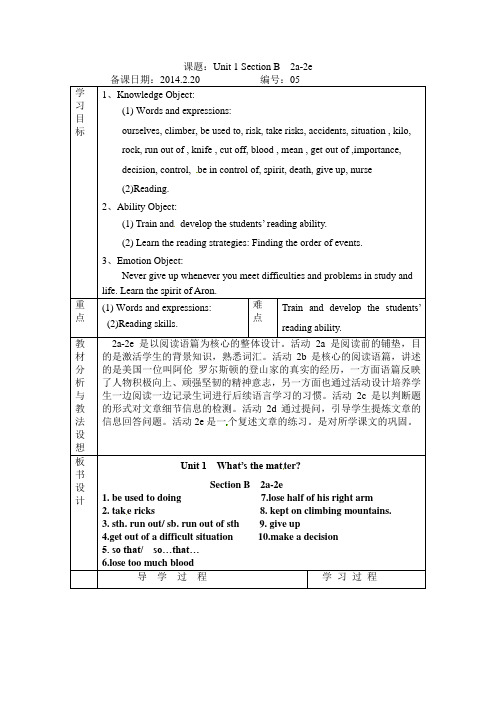
1.Play the video of the movie 127 Hours. Ss watch it and feel the difficult situation.
2.Present the new words and expressions by showing the pictures on the screen:
2.2c. Read the passage and circle TRUE, FALSE or DON’T KNOW.
(1)Aron almost lost his life three times because of climbing accidents.
(2)Aron had a serious accident in April 2003.
take ricks, caught under a 360-kilo rock, fell on somebody, find yourself in a very dangerous situation, get out of a difficult situation , bandage yourself, lose too much blood, lose half of his right arm, kept on climbing mountains.
3. Ask Ss to read aloud the expressions in2aand the new expressions.
Step3.Reading
1.2b. Read the passage and underline the words you don’t know. Then look up the words in a dictionary and write down their meanings.( decision, control, spirit, death , mean , importance, be used to , free , run out of ,keep on)
- 1、下载文档前请自行甄别文档内容的完整性,平台不提供额外的编辑、内容补充、找答案等附加服务。
- 2、"仅部分预览"的文档,不可在线预览部分如存在完整性等问题,可反馈申请退款(可完整预览的文档不适用该条件!)。
- 3、如文档侵犯您的权益,请联系客服反馈,我们会尽快为您处理(人工客服工作时间:9:00-18:30)。
Unit 1 What’s the matter ? (Period 1 )
学情分析:本节课的教学对象是八年级学生。
八年级在初中阶段起着承上启下的作用,学生已掌握了一些英语基础知识,但综合运用语言的能力和习惯还没形成,从英语文章中获取信息和用英语表达自己想法的能力还有待提高。
他们正处于由感性向理性的转型期,学习中他们依然喜欢从游戏或活动中获取知识。
教学中老师要根据学生这些特征,遵循循序渐进的原则,化难为易让他们轻松愉快地掌握知识。
Teaching objectives
1.Be able to tell the parts of body in English .
2.Be able to use the following words and phrases: rest , hurt, cough, have a cold /fever /cough ,
have a headache /toothache /stomachache, have a sore back /throat /neck, cut myself,
lie down and rest, take one’s temperature, get an X-ray
3.Be able to use the following sentence structure to talk about healthy problems and give
advice. What’s the matter ?/What’s wrong ? I have a …/He has a… , You/He should…
4.Be able to use the following listening skills to comprehend the text. Such as prediction,
listening for gist, listening for specific information, listening for details.
5.Be able to use what they learned to talk about health problems and give advice.
6.Be able to use the language they learned to finish a conversation
Educational objectives
1.Arousing student’s interest
2.Caring for health and others
3.Building their confidence by step by step approach
Important points
1.Be able to use the new words and phrases
2.Be able to talk about health problems and give advice.
3.Understanding the content of listening material.
Difficult points
ing what they learned to talk about health problems and give advice,
ing the language they learned to finish a conversation .
Teaching steps
Step1.Greetings
1.Exchange greeting
rmal chatting
Step 2. Lead in
Watch a cartoon and listen to a song.
Step3.Revision
1.Revise the parts of the body by showing a picture
2.Play a game
plete the task in 1a.
Step 4.Pre-listening
1. Vocabulary presentation
1.) Show a picture
Boy: What’s the matter with you?/ What’s wrong with you ?
Girl: I have a fever, I’m taking my temperature.
2). Teach other illnesses by showing pictures.
2. Talk about the picture in 1a .
Where are they ? Who is the woman in white ? What’s wrong with them?
3. Read through the five names in 1b and then ask, Who is Sarah ? What’s the matter with her? Can you find her in the picture ?
Step 5.While-listening
1.Listen and number the names (1-5)
3.Make conversations according to the information in the form .
4.Point at the pictures in 2a and talk about each picture with the class.
5.Listen and number the pictures (1-5)
6.Go through the advice in 2b, ask students to try to match the problems with the advice. Then
listen to the conversations again and check their answers .
7.Fill in the blanks
A: I ate too much last night , now I have a stomachache.
B: You __________ eat so much next time, now you _______ lie down and rest.
判断下列句子正误
1)Linda has a bad cold .She should goes to the doctor.
2)Does Tom should take his temperature ?
Should / shouldn’t + do
8. Ask and answer about the picture : What should they do ?
Step6.post-listening
1.Make conversations using the information in 2a and 2b.
2.Do exercises.
3.Fill in the blanks to complete the conversation
Doctor:_________________ ?
Peter :I have a cough and sore throat.
Doctor: When did it start ?
Peter: Last night.
Doctor: Open your mouth and say “ah “
Peter: Ah
Doctor: Let me _______________.
(ten minutes later) Your temperature is normal. You don’t have a __________.
Nothing serious. But you should take some ___________ . You should also drink some hot tea___________.
Peter: Thank you.
Doctor: You’re welcome.
Step 7.Summary and homework
1.Revise the new words and expressions.
教学思路分析:这是一节听说课,话题是谈论健康问题并给出建议,分为听前、听中、听后和输出几个部分。
听前是为听中做准备的,首先通过图片和游戏复习身体各部位名称,其次,通过图片和情境呈现目标语言What’s the matter ?和新单词fever,headache, sore throat等。
然后通过讨论书上的图片预测听力内容,激发学生听的欲望,为下一步的听做好充分准备。
听的过程中,分别设置由易到难不同的听力任务,训练学生的各项听力技能。
听后让学生根据听力内容编出自己的对话,然后再让他们运用所学单词和句型去完成一个新对话,达到学以致用的目的。
